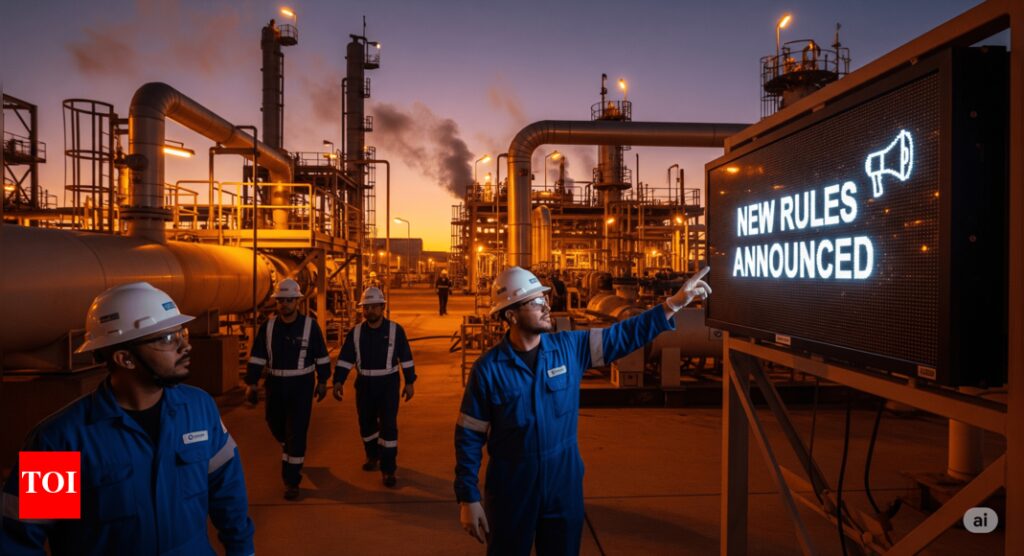Oman’s new rule: Professional licenses now mandatory for oil & gas jobs, check if your job is on the list | World News

TL;DR:
Oman ’s Ministry of Labour has mandated that, effective September 1, 2025, licensing is required for dozens of job roles in the oil and gas sector.
- Workers in these positions must obtain a license from the
Energy and Minerals Sector Skills Unit , coordinated by theOman Energy Society , before new or renewed work permits will be issued.
- The initiative is aimed at regulating the labor market, upskilling the workforce, and aligning with national
Omanisation objectives.
As part of a push to enhance professional standards and workforce quality, Oman is introducing strict licensing requirements for a range of technical and operational positions in its oil and gas sector. This move, which comes into effect from September 1, 2025, is intended to further regulate the labor market and ensure that both Omanis and expatriates working in these critical fields meet verified competency benchmarks.
Scope and purpose
The mandate specifies that individuals working in, or seeking employment for, certain positions within the oil and gas sector must acquire a Professional Practice License from the Energy and Minerals Sector Skills Unit, under the Oman Energy Society. This license serves as a compulsory prerequisite for both initial work permit issuance and subsequent renewals for the affected roles. The Ministry of Labour will not grant or renew permits without submission of this license. Establishments have been instructed to ensure all their relevant employees comply with the new system.
Professions requiring licensing
The measure covers a wide set of technical, mechanical, and operational roles which are:
- HSE Advisor
- Mobile Crane Operator
- Telescopic Handler Operator
- Forklift Operator
- Excavator Operator
- MEWP Operator
- Slinger/Signaller/Rigger
- Overhead Crane Operator
- Vehicle Marshal
- Lifting Supervisor
- Appointed Person
- Mud Tester
- Facilities Maintenance Craftsperson
- Manual Welder
- Mechanical Craftsperson
- Assistant Driller
- Building Maintenance Technician
- Automated Mechanized Welding Operator
- Machine Operator
- CNC Machine Operator
- Electrical Craftsperson
- Facilities Maintenance Fitter
- Sheet Metalworker
- Driller
- Production Assembler
- Machinist
- Instrument Craftsperson
- Roustabout
- Facilities Maintenance Technician
- Plate Worker
- Mechanical Technician
- Floorman
- Structural Steelworker
- CNC Machinist
- Electrical Technician
- Pipe and Tube Fabricator
- Derrickman
- Instrument Technician
- Tool Pusher
- Welding Assistant
- Machine Tool Technician
- Fitting and Assembly Technician
- Pipe and Fitting Assembling Technician
A total of 43 specific job titles are subject to the new rules.
Implementation and process
- The licensing process is handled by the Oman Energy Society, with verification of candidate qualifications, experience, and, where applicable, practical assessments.
- The license is now a core requirement for both Omanis and expatriates when applying for or renewing a work permit for any of the listed sectors.
- Failure to obtain this license means no new or renewed work permit will be granted for these roles.
Nationalisation (Omanisation) context
- Oman’s localisation efforts in oil and gas are already advanced, with a reported 89 percent Omanisation rate and 17,900 nationals employed as of the 2024 government report. Major players like Petroleum Development Oman and Daleel Petroleum have reached 90 percent Omanisation rates.
- Oman’s mining sector, by contrast, features a 23 percent Omanisation rate, with around 900 Omanis employed, underscoring the varied pace across sectors.
Parallel licensing requirement for logistics sector
The Ministry also announced, effective September 1, 2025, mandatory licensing for several logistics roles, including:
- Refrigerated truck driver (tractor-trailer)
- Water tanker driver (tractor-trailer)
- Tractor head driver (trailer)
- Waste transport truck driver
- Food delivery representative and supervisor
For these jobs, a Professional Practice License from the Sectoral Skills Unit for the Logistics Sector is now obligatory for both Omanis and foreign workers before work permits are issued or renewed.
Objective and impact
These licensing initiatives aim to:
- Elevate occupational standards and ensure competency
- Enhance the safety, reliability, and professionalism of the workforce
- Support Oman’s Vision 2040 targets for national workforce development and sectoral Omanisation
- Create a transparent and competitive business environment that rewards verified skill and compliance
Oman’s new licensing requirements for oil, gas, and logistics sector jobs mark a decisive regulatory step in aligning labour practices with international standards, improving workforce quality, and supporting localisation. Affected companies and professionals must ensure they obtain the necessary professional licenses from recognised sectoral bodies, or risk losing eligibility for work permits after September 1, 2025. This move is expected to foster safer operations, higher skills, and equitable access to key positions in critical industries.







